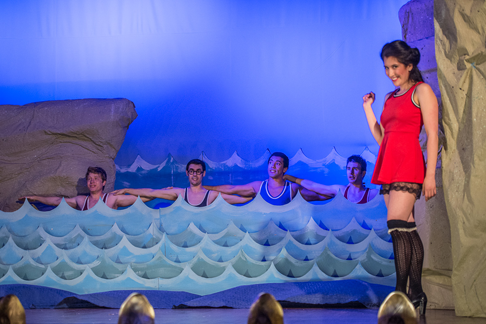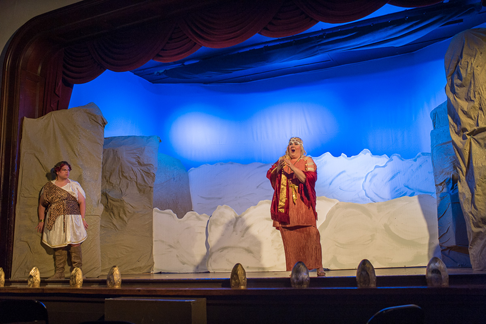Recently in Reviews
English Touring Opera are delighted to announce a season of lyric monodramas to tour nationally from October to December. The season features music for solo singer and piano by Argento, Britten, Tippett and Shostakovich with a bold and inventive approach to making opera during social distancing.
This tenth of ten Live from London concerts was in fact a recorded live performance from California. It was no less enjoyable for that, and it was also uplifting to learn that this wasn’t in fact the ‘last’ LfL event that we will be able to enjoy, courtesy of VOCES8 and their fellow vocal ensembles (more below …).
Ever since Wigmore Hall announced their superb series of autumn concerts, all streamed live and available free of charge, I’d been looking forward to this song recital by Ian Bostridge and Imogen Cooper.
The Sixteen continues its exploration of Henry Purcell’s Welcome Songs for Charles II. As with Robert King’s pioneering Purcell series begun over thirty years ago for Hyperion, Harry Christophers is recording two Welcome Songs per disc.
Although Stile Antico’s programme article for their Live from London recital introduced their selection from the many treasures of the English Renaissance in the context of the theological debates and upheavals of the Tudor and Elizabethan years, their performance was more evocative of private chamber music than of public liturgy.
In February this year, Albanian soprano Ermonela Jaho made a highly lauded debut recital at Wigmore Hall - a concert which both celebrated Opera Rara’s 50th anniversary and honoured the career of the Italian soprano Rosina Storchio (1872-1945), the star of verismo who created the title roles in Leoncavallo’s La bohème and Zazà, Mascagni’s Lodoletta and Puccini’s Madama Butterfly.
Evidently, face masks don’t stifle appreciative “Bravo!”s. And, reducing audience numbers doesn’t lower the volume of such acclamations. For, the audience at Wigmore Hall gave soprano Elizabeth Llewellyn and pianist Simon Lepper a greatly deserved warm reception and hearty response following this lunchtime recital of late-Romantic song.
Collapsology. Or, perhaps we should use the French word ‘Collapsologie’ because this is a transdisciplinary idea pretty much advocated by a series of French theorists - and apparently, mostly French theorists. It in essence focuses on the imminent collapse of modern society and all its layers - a series of escalating crises on a global scale: environmental, economic, geopolitical, governmental; the list is extensive.
For this week’s Live from London vocal recital we moved from the home of VOCES8, St Anne and St Agnes in the City of London, to Kings Place, where The Sixteen - who have been associate artists at the venue for some time - presented a programme of music and words bound together by the theme of ‘reflection’.
'Such is your divine Disposation that both you excellently understand, and royally entertaine the Exercise of Musicke.’
Amongst an avalanche of new Mahler recordings appearing at the moment (Das Lied von der Erde seems to be the most favoured, with three) this 1991 Mahler Second from the 2nd Kassel MahlerFest is one of the more interesting releases.
‘And there was war in heaven: Michael and his angels fought against the dragon; and the dragon fought and his angels, And prevailed not; neither was their place found any more in heaven … that old serpent … Satan, which deceiveth the whole world: he was cast out into the earth, and his angels were cast out with him.’
If there is one myth, it seems believed by some people today, that probably needs shattering it is that post-war recordings or performances of Wagner operas were always of exceptional quality. This 1949 Hamburg Tristan und Isolde is one of those recordings - though quite who is to blame for its many problems takes quite some unearthing.
There was never any doubt that the fifth of the twelve Met Stars Live in Concert broadcasts was going to be a palpably intense and vivid event, as well as a musically stunning and theatrically enervating experience.
‘Love’ was the theme for this Live from London performance by Apollo5. Given the complexity and diversity of that human emotion, and Apollo5’s reputation for versatility and diverse repertoire, ranging from Renaissance choral music to jazz, from contemporary classical works to popular song, it was no surprise that their programme spanned 500 years and several musical styles.
The Academy of St Martin in the Fields have titled their autumn series of eight concerts - which are taking place at 5pm and 7.30pm on two Saturdays each month at their home venue in Trafalgar Square, and being filmed for streaming the following Thursday - ‘re:connect’.
The London Symphony Orchestra opened their Autumn 2020 season with a homage to Oliver Knussen, who died at the age of 66 in July 2018. The programme traced a national musical lineage through the twentieth century, from Britten to Knussen, on to Mark-Anthony Turnage, and entwining the LSO and Rattle too.
With the Live from London digital vocal festival entering the second half of the series, the festival’s host, VOCES8, returned to their home at St Annes and St Agnes in the City of London to present a sequence of ‘Choral Dances’ - vocal music inspired by dance, embracing diverse genres from the Renaissance madrigal to swing jazz.
Just a few unison string wriggles from the opening of Mozart’s overture to Le nozze di Figaro are enough to make any opera-lover perch on the edge of their seat, in excited anticipation of the drama in music to come, so there could be no other curtain-raiser for this Gala Concert at the Royal Opera House, the latest instalment from ‘their House’ to ‘our houses’.
"Before the ending of the day, creator of all things, we pray that, with your accustomed mercy, you may watch over us."
Reviews
![Tracy Cox as Ariadne [Photo by Martha Benedict]](http://www.operatoday.com/ariadne-cox-9046-2.png)
19 May 2015
Pacific Opera Project Presents Ariadne auf Naxos
Pacific Opera Project, a small Los Angeles company, presented a production of Richard Strauss's Ariadne auf Naxos at the Ebell Club with an excellent group of young singers at the beginning of what should be good careers.
Richard Strauss’s opera, Ariadne auf Naxos, is always a bit complicated. On May 14, 2015, Pacific Opera Project portrayed the opera’s setting as the actual opening of the Ebell Club in Highland Park, CA, in 1913. There were two contenders for the opening night’s entertainment: a newly commissioned opera, Ariadne auf Naxos, by an important new composer, and a very popular vaudeville show starring the well known entertainer, Zerbinetta. H.H. Meyer, husband of one of the club members, suggested having both shows run simultaneously. Members passed his motion so that all the indoor entertainment could conclude by 10:30 PM when technicians would set off a display of fireworks.
Pacific Opera Project, a small Los Angeles company, presented the production of the Strauss opera with an excellent group of young singers at the beginning of what should be good careers. Although the setting was 1913, the Ebell Club audience heard the 1916 edition of the opera rather than the far more difficult original version. The auditorium was set up so that the audience of two hundred sat at tables with refreshments while they watched the opera.
 Sara Duchovnay as Zerbinetta with her troupe
Sara Duchovnay as Zerbinetta with her troupe
The main character in the first act was The Composer. Played by Claire Shackleton, she moved extremely well and had exemplary diction but her voice tended to be unsteady on longer notes. Dialoguing with her, Music Teacher Ryan Thorn sang with burnished bronze tones. After the intermission he and Timothy Campbell sang an amusing version of Cole Porter’s Brush Up Your Shakespeare to advertise the company’s next production: Falstaff.
Tracy Cox, the Ariadne, had a huge dramatic voice that seemed ready for a much larger space. Her sound was opulent and her top notes radiant. She did not have a great deal to sing in the first act but her glorious Act II aria, Es gibt ein Reich, was definitely worth waiting for. Her accompanying trio consisted of Maria Elena Altany, Kelci Hahn, and Sarah Beaty. Altany, the Susanna in Los Angeles Opera’s Figaro 90210, sang Naiad with honeyed tones. Hahn was an attractive Echo, and Beaty handled the low notes gracefully as Dryad. Dramatic tenor Brendan Sliger sang Bacchus, the god of wine and lover of Princess Ariadne. With powerful resonant tones and firm stagecraft, he took her from dark lamentation over the loss of Theseus into the light of new love and an eternal place in the heavens.
 Brendan Sliger as Bacchus and Tracy Cox as Ariadne
Brendan Sliger as Bacchus and Tracy Cox as Ariadne
Sara Duchovnay sang Zerbinetta, the leading lady of the vaudeville company who finds herself onstage at the same time as the operatic tragedy. Duchovnay is a charismatic stage creature. Although she does not have a trill and she tossed some of the coloratura runs off rather lightly, she was a fascinating Zerbinetta. When she was onstage all eyes were upon her. Her troupe included Nicholas LaGesse as Harlequin, Jon Lee Keenan as Scaramuccio, Robert Norman as Brighella and Keith Colclough as Truffaldino. All were capable vaudevillians with the most interesting voices coming from Norman and LaGesse.
This production did not need a full sized orchestra because of the size of the hall. Christopher Fechteau’s reduction of each group to a single instrument was adequate accompaniment. Conductor Stephen Karr led his players in smart, brisk tempi while giving the singers enough leeway to create believable characters and bring out emotional expression. This production of Ariadne auf Naxos introduced an interesting young company and allowed the Los Angeles audience to hear some fine new singers.
Maria Nockin
![Tracy Cox as Ariadne [Photo by Martha Benedict]](http://www.operatoday.com/ariadne-cox-9046-2.png)

